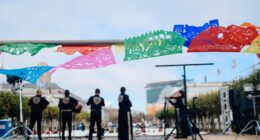In today’s music industry, independent artists have more opportunities than ever before to create and share their music with the world. However, with so much competition and noise, it is crucial for independent artists to have a strong music marketing strategy in order to stand out and succeed. A well-executed marketing plan can help independent artists build a loyal fan base, increase their visibility, and ultimately achieve their goals.
Key Takeaways
- The indie music industry is a competitive and constantly evolving landscape.
- Building a strong brand identity and online presence is crucial for success as an independent artist.
- Social media is a powerful tool for music marketing and connecting with fans.
- Networking and collaborating with other indie artists can lead to new opportunities and growth.
- Measuring success as an independent artist requires tracking metrics such as streams, downloads, and live performance attendance.
Understanding the Indie Music Industry
The indie music industry refers to the sector of the music industry that is made up of independent artists who operate outside of major record labels. These artists have full creative control over their music and often rely on self-promotion and grassroots efforts to gain recognition. However, the indie music industry also presents unique challenges for independent artists. They often have limited resources and face difficulties in getting their music heard by a wider audience.
To succeed as an independent artist, it is important to understand the inner workings of the indie music industry. This includes understanding how to navigate the digital landscape, how to effectively promote your music, and how to connect with fans. By understanding the industry, independent artists can make informed decisions about their career path and develop strategies that will help them overcome challenges.
Creating a Strong Brand Identity
In a crowded market, having a strong brand identity is essential for independent artists. Your brand identity is what sets you apart from other artists and helps fans connect with your music on a deeper level. It encompasses everything from your visual aesthetics to your values and the story you tell through your music.
To create a unique brand identity, start by defining your target audience and understanding what they are looking for in an artist. Then, think about what makes you different from other artists in your genre and how you can communicate that through your brand. Develop a consistent visual style that reflects your music and personality, and use it across all your marketing materials.
Building Your Online Presence
| Metrics | Description |
|---|---|
| Website Traffic | The number of visitors to your website. |
| Conversion Rate | The percentage of website visitors who take a desired action, such as making a purchase or filling out a form. |
| Social Media Followers | The number of people who follow your social media accounts. |
| Engagement Rate | The percentage of social media followers who engage with your content, such as liking, commenting, or sharing. |
| Search Engine Ranking | Your website’s position in search engine results for specific keywords. |
| Backlinks | The number of other websites that link to your website. |
In today’s digital age, having a strong online presence is crucial for independent artists. Your website and social media profiles serve as your virtual storefronts, where fans can discover your music, learn more about you, and engage with your brand. It is important to have a professional-looking website that showcases your music, provides information about upcoming shows and releases, and allows fans to easily connect with you.
In addition to your website, social media platforms such as Facebook, Instagram, and Twitter are powerful tools for promoting your music and engaging with fans. Regularly update your social media profiles with new content, interact with your followers, and use targeted advertising to reach a wider audience. Building an online presence takes time and effort, but it is an essential part of any music marketing strategy.
Utilizing Social Media for Music Marketing
Social media has revolutionized the way artists promote their music. It allows independent artists to reach a global audience without the need for a major record label. Social media platforms provide a direct line of communication between artists and fans, allowing for real-time engagement and feedback.
To effectively use social media for music marketing, it is important to have a clear strategy in place. Determine which platforms are most popular among your target audience and focus your efforts on those platforms. Regularly post engaging content such as behind-the-scenes footage, live performances, and updates on upcoming releases. Interact with your followers by responding to comments and messages, and collaborate with other artists to expand your reach.
Networking and Collaborating with Other Indie Artists

Networking and collaborating with other independent artists can be highly beneficial for your music career. By connecting with like-minded artists, you can share resources, gain exposure to new audiences, and learn from each other’s experiences. Collaborations can also lead to creative breakthroughs and help you develop new skills.
To find and connect with other indie artists, attend local shows and industry events, join online communities and forums, and reach out to artists whose music you admire. Be genuine in your interactions and offer something of value in return. Collaborate on projects such as joint EPs, music videos, or live performances, and promote each other’s work through your respective networks.
Developing a Music Marketing Strategy
Having a music marketing strategy is essential for independent artists who want to achieve their goals. A well-developed strategy will help you stay focused, make informed decisions, and measure your progress. Start by setting clear and realistic goals for your music career, such as increasing your fan base, booking more gigs, or releasing a new album.
Next, identify your target audience and develop a plan to reach them. This may include creating a content calendar for your social media posts, reaching out to music blogs and playlists for features, or running targeted advertising campaigns. Regularly evaluate the effectiveness of your marketing efforts and make adjustments as needed.
Promoting Your Music through Live Performances
Live performances are a powerful tool for promoting your music and connecting with fans on a deeper level. They allow you to showcase your talent, engage with your audience, and create memorable experiences. In addition to traditional venues, consider performing at festivals, house concerts, and other non-traditional spaces to reach new audiences.
To book gigs and promote your music through live performances, start by researching local venues and reaching out to bookers and promoters. Create a compelling press kit that includes your bio, press photos, and samples of your music. Be professional in your communication and follow up after each performance to thank the venue and build relationships.
Creating a Music Marketing Blog
Having a music marketing blog can be a valuable asset for independent artists. It allows you to share your journey, connect with fans on a deeper level, and establish yourself as an authority in the industry. A blog can also help drive traffic to your website and increase your visibility in search engine results.
To create a Music Marketing Blog, start by identifying your target audience and the topics they are interested in. Develop a content strategy that includes a mix of informative and entertaining posts, such as music reviews, interviews with other artists, and behind-the-scenes stories. Regularly update your blog with new content and promote it through your social media channels.
Measuring Your Success as an Independent Artist
Measuring your success as an independent artist is important for tracking your progress and making informed decisions about your music career. Set specific goals for yourself, such as increasing your social media following, getting more streams on your music platforms, or booking a certain number of gigs. Regularly track your progress towards these goals and adjust your music marketing strategy accordingly.
Use analytics tools provided by social media platforms and music streaming services to gather data about your audience and their engagement with your music. Pay attention to metrics such as likes, comments, shares, and streams to gauge the effectiveness of your marketing efforts. Experiment with different strategies and tactics to see what works best for you.
In conclusion, having a strong music marketing strategy is crucial for independent artists who want to succeed in the industry. By understanding the indie music industry, creating a strong brand identity, building an online presence, utilizing social media, networking with other artists, developing a marketing strategy, promoting through live performances, creating a music marketing blog, and measuring their success, independent artists can increase their visibility, connect with fans, and achieve their goals. It takes time and effort to build a successful music career, but with the right strategy in place, independent artists can make their mark in the industry.
If you’re an independent artist looking to build your brand in the competitive world of indie music, you’ll definitely want to check out this insightful article on musicmarketing.blog. In their post titled “Hello World: A Guide to Indie Music Marketing,” they provide valuable tips and strategies for artists like you who are navigating the ever-changing landscape of the music industry. From creating a strong online presence to leveraging social media platforms effectively, this article offers practical advice that can help you stand out from the crowd. Don’t miss out on this must-read resource – click here to dive into the world of indie music marketing!
FAQs
What is indie music marketing?
Indie music marketing refers to the process of promoting and building the brand of an independent artist or band without the support of a major record label.
Why is building a brand important for independent artists?
Building a brand is important for independent artists because it helps them stand out in a crowded music industry. A strong brand can help attract fans, secure gigs, and increase revenue streams.
What are some effective marketing strategies for independent artists?
Some effective marketing strategies for independent artists include social media marketing, email marketing, content marketing, and influencer marketing. It’s important to tailor your marketing strategy to your specific audience and goals.
How can independent artists use social media to promote their music?
Independent artists can use social media to promote their music by creating engaging content, interacting with fans, and using targeted advertising. Platforms like Instagram, Twitter, and TikTok can be particularly effective for building a fanbase.
What is content marketing and how can it benefit independent artists?
Content marketing involves creating and sharing valuable content to attract and retain a specific audience. For independent artists, content marketing can help build a loyal fanbase and establish credibility in the industry.
What is influencer marketing and how can independent artists use it?
Influencer marketing involves partnering with individuals who have a large following on social media to promote your music. Independent artists can use influencer marketing to reach new audiences and build their brand. It’s important to choose influencers who align with your brand and target audience.









